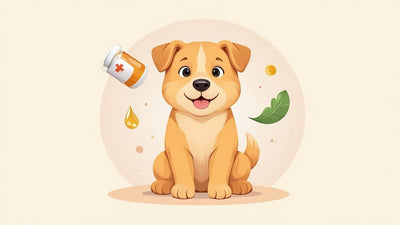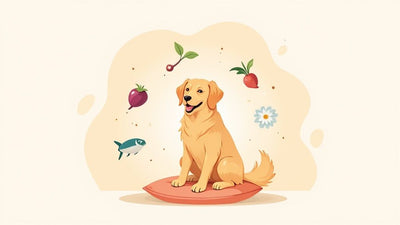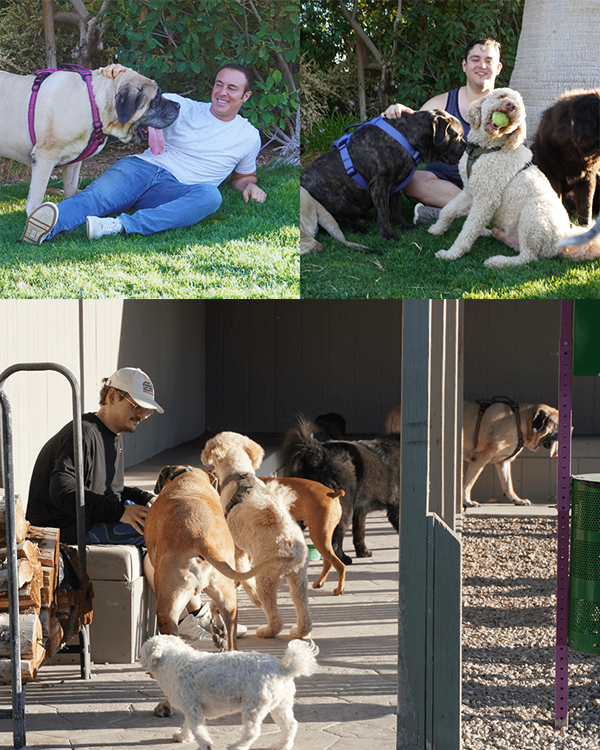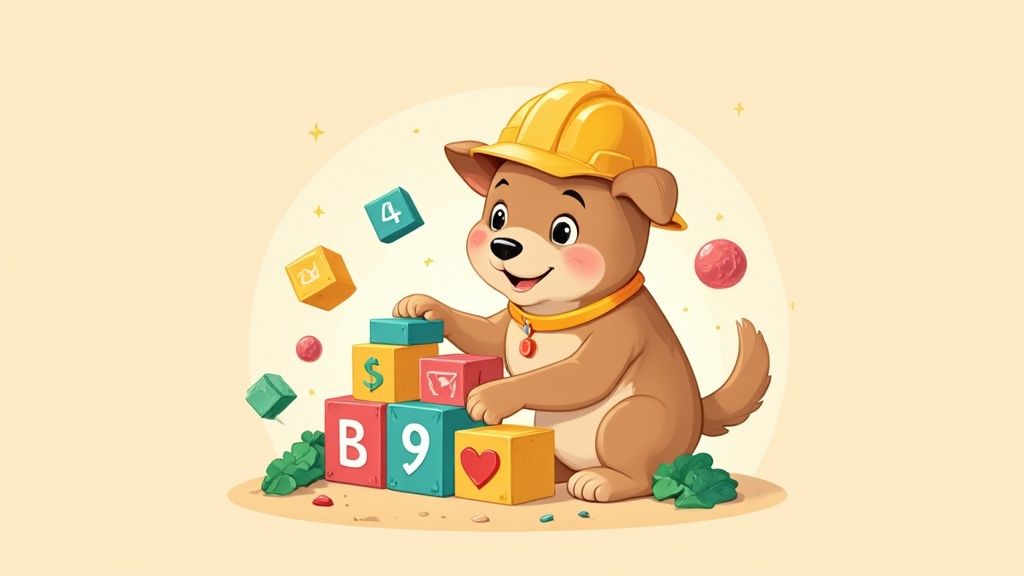
Dog Folic Acid: Supporting Your Friend Through Their Golden Years
You’ve probably seen folic acid on an ingredient list, but what does it actually do for your dog? We understand. It’s more than just a name. Think of it as a quiet supporter, working behind the scenes to help your dog’s body with some of its most fundamental jobs.
This essential nutrient, also known as Vitamin B9, plays a gentle but powerful role in everything from your dog's energy levels to their mental clarity, helping them feel their best day in and day out.
What Folic Acid Does For Your Dog

When you start looking into your dog's nutritional needs, you're doing more than just feeding them—you're giving them the building blocks for a long, happy life. We know this journey is especially important for our aging friends. Folic acid is one of those foundational components that supports their health from the inside out.
Imagine a busy construction site where new cells are constantly being built. Folic acid is like the project manager, making sure the whole operation runs smoothly. Its main job is to help create and repair DNA, which is the blueprint for every single cell. Without enough of it, this vital work can slow down.
Why It’s Key to Their Daily Vitality
This B-vitamin is a behind-the-scenes hero, responsible for functions that show up in your dog’s daily behavior and energy.
- Helps Make Healthy Red Blood Cells: Folic acid is essential for forming red blood cells. These cells act like a delivery service, rushing oxygen to every part of the body—especially the brain. Good oxygen flow is critical for maintaining energy and mental clarity.
- Supports the Nervous System: It also helps the nervous system run smoothly. Think of it as maintaining the communication lines between the brain and the rest of the body, a connection that's incredibly important for our senior dogs.
- Fuels Cellular Growth: From playful puppies to wise old seniors, all dogs depend on a constant cycle of cell growth and repair. Folic acid provides gentle support for this continuous renewal.
The Science Behind It All
Folic acid is so important to health that its value is recognized globally. Research continually confirms its role in DNA synthesis and red blood cell formation, particularly for puppies and pregnant dogs. In fact, the entire folic acid market was valued at around USD 1.04 billion in 2024, which shows just how vital it is for both human and animal wellness. You can discover more insights about this growing market on grandviewresearch.com.
We believe that supporting your dog’s foundational health is the first step toward more good days together. Small nutritional details, like ensuring adequate B-vitamin intake, can make a meaningful difference in their comfort and happiness.
You don't need a science degree to understand the basics. It’s about being an informed and loving dog parent. Folic acid works as part of a team with other nutrients to build a strong foundation for health. Making sure your dog gets enough is a simple, gentle way to support them through every stage of life.
It's just one piece of the wellness puzzle, and you can learn more about other immune supplements for dogs in our comprehensive guide.
Get Your FREE Dog Brain Health Guide

Get instant FREE access to today's top ways to help your best friend live a longer, healthier, happier life.
- 39 value-packed pages of expert insights
- Early-detection tips for cognitive decline
- Top brain-boosting superfoods
- Vet-approved mental sharpness strategies
- Fun IQ tests for your dog
How to Spot Signs of a Nutritional Gap
You know your dog better than anyone. You're the one who notices the tiny shifts—that slight pause before they hop on the bed, or how they seem less excited about their walk. We get it. Those little changes can plant a seed of worry, often leading to those 3 AM internet searches for answers.
When it comes to a potential dog folic acid deficiency, the signs are rarely a flashing red light. Think of them more like gentle whispers telling you something isn't quite right. You’re not imagining it, and you're not overreacting by paying attention.
Subtle Shifts in Daily Behavior
A nutritional gap doesn't usually look like a sudden, dramatic illness. Instead, it often presents as a slow decline in your dog's usual get-up-and-go. The idea here isn’t to play vet, but to arm you with observations for a more meaningful conversation with your actual veterinarian.
Here are a few things you might notice:
- Less Energy on Walks: Is your dog lagging behind on routes they used to breeze through? A drop in stamina can sometimes be tied to the body's ability to make healthy red blood cells—a job that heavily relies on folic acid.
- Changes in Appetite: Has your dog's once-favorite food suddenly become unappealing? A consistent loss of interest in food is definitely something to track.
- Dull Coat or Skin: Has their coat lost its shine? Skin and hair are made of rapidly dividing cells, and they need a steady supply of nutrients like B-vitamins to stay healthy.
This infographic breaks down some common, relatable signs that could point to a nutritional gap.
It helps connect the dots between an internal need (like proper vitamin levels) and what you see on the outside, like fatigue or a waning appetite.
Observing Your Dog: Small Changes Matter
Noticing these patterns is the first step in supporting your dog’s well-being. This is about observation, not anxiety. Here's a simple checklist to help you frame what you might be seeing at home.
| Area of Observation | What You Might Notice | What This Could Mean |
|---|---|---|
| Energy Levels | They seem more tired or less interested in playing than usual. | The body may need a little extra help with red blood cell production, which is essential for carrying oxygen. |
| Appetite & Digestion | They're just picking at their food, losing weight, or having occasional diarrhea. | It could be a signal that their body is struggling to absorb nutrients as effectively as it should. |
| Physical Appearance | Their coat looks dull, or you notice changes to their tongue or gums. | Cellular health, which leans on B vitamins, might need some gentle nutritional support. |
These are just observations, and a single sign is rarely a cause for panic. Think of them as clues you're collecting.
You are your dog's most important advocate. Trusting your gut when you feel something has changed is a powerful act of love. These observations are valuable pieces of information, not reasons for alarm.
Keep in mind that every dog's journey is unique. Seeing one of these signs is simply an invitation to look a little closer and team up with your vet. Your attentiveness is what ensures your best friend has everything they need to feel their best.
The Benefits of Folic Acid for Senior Dogs
As our dogs enter their golden years, our focus shifts. It's less about long hikes and more about cherishing the small, happy moments—a flicker of recognition, a comfortable nap, a gentle tail wag. Folic acid can be a quiet but powerful ally in creating more of these good days. It's not a miracle cure, but it is a gentle way to support their comfort from the inside out.
https://www.youtube.com/embed/tDXUd_GOst4
One of the most important jobs this B-vitamin has is helping the body create healthy red blood cells. Think of these cells as a dedicated oxygen delivery service. They rush life-giving oxygen to every part of your dog’s body, from their nose to their tail—and most importantly, to their brain.
For a senior dog, ensuring this simple biological process runs smoothly is a cornerstone of vitality. Good oxygen flow can translate into real, tangible benefits you can see and feel in your daily life together.
Supporting Mental Clarity and Energy
When your dog's brain gets a steady, reliable supply of oxygen, it has the fuel it needs to function well. This support can help maintain mental sharpness, making it easier for them to navigate their world. Those little moments of confusion you might worry about, like getting stuck in a corner or standing at the wrong side of the door, are often tied to cognitive health. If this sounds familiar, our guide on understanding cognitive decline in dogs can offer more insight.
Ensuring your dog has enough folic acid helps with:
- Maintaining Brain Function: By supporting red blood cell production, it makes sure the brain gets the oxygen it needs to think clearly.
- Promoting Stable Energy: Good circulation helps with the lethargy that can creep in with age, leading to more consistent energy throughout the day.
- Supporting Nerve Health: Folic acid also plays a key role in nerve function, keeping the communication lines between the brain and the body in good working order.
This isn't just an observation from loving pet owners; the animal nutrition industry has taken notice. The global market for folic acid in animal feed was valued at around USD 700 million in 2023 and is expected to grow. This reflects a wider understanding of how important targeted nutrition is for our pets.
You're not alone in wanting to make your dog's senior years as comfortable as possible. Focusing on foundational support, like ensuring they get the right nutrients for healthy circulation, is one of the most meaningful ways you can show your love.
Ultimately, the goal here is realistic optimism. By supporting your dog’s core biological systems, you are actively helping to preserve their quality of life. Every small improvement—a peaceful night's sleep or a clear-eyed moment of connection—is a victory worth celebrating on this journey together.
Natural Food Sources of Folic Acid for Dogs
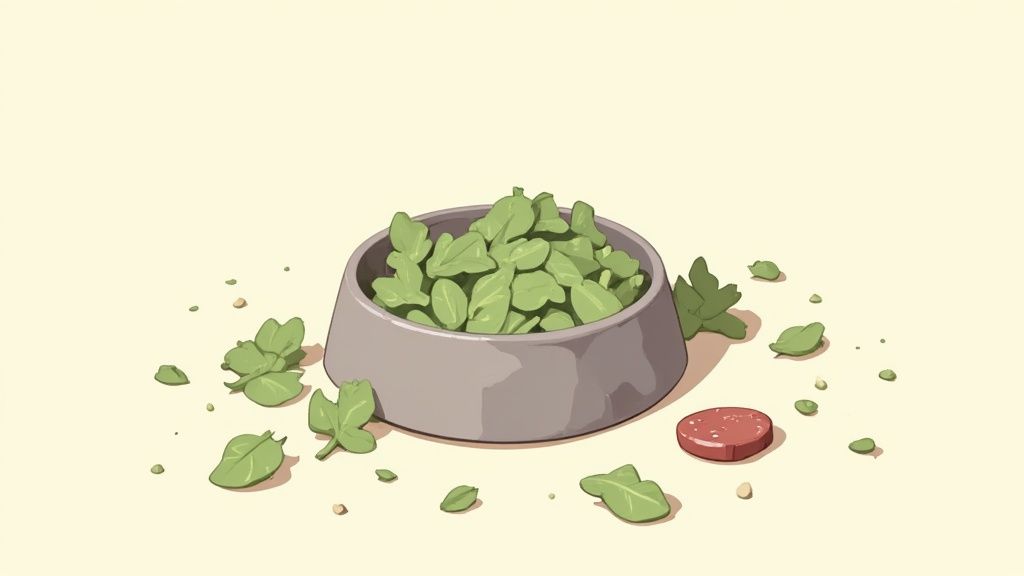
We all want to give our dogs the very best, and adding fresh, whole foods to their diet is a wonderful way to do that. It just feels right to add a little something extra to their bowl, and many kitchen staples are naturally rich in folate (the food-based form of folic acid).
Boosting their nutrition with real food is a simple, loving way to support their long-term health.
Simple, Dog-Friendly Options
Many everyday foods can provide a natural source of dog folic acid. The trick is to always serve them in moderation and prepare them safely. That means no added seasonings like salt, garlic, or onions, which can be harmful to dogs.
Here are a few great choices to consider:
- Leafy Greens: Think spinach and kale. These are folate powerhouses. To help your dog’s digestion, it's best to lightly steam and finely chop them. Just a spoonful mixed into their regular food is all you need.
- Organ Meats: Liver, particularly from chicken or beef, is one of the most concentrated sources of folate. It needs to be cooked thoroughly and served in small pieces, as it's also very high in other nutrients like Vitamin A.
- Legumes: Cooked beans and lentils are another solid option. Be aware, though—they can sometimes cause gas. Introduce them very slowly and in tiny amounts to see how your dog's system handles them.
The Challenge with Food-Based Folate
While adding fresh foods is a wonderful gesture, let’s be realistic. It can be tough to deliver a consistent and meaningful amount of folic acid through diet alone, especially for our senior dogs who need it most.
You’re not doing anything wrong if your dog is a picky eater or if you find it hard to measure exact nutrient amounts from food. The journey of caring for an aging dog is all about finding what works for both of you.
Picky eaters might turn their nose up at a piece of kale, and older dogs with sensitive stomachs may not tolerate new foods well. Plus, the folate content in food can vary, and the cooking process itself can reduce its potency.
This is where the conversation naturally turns to supplementation. A quality supplement offers a precise, reliable dose to fill in any nutritional gaps. It gives you peace of mind, knowing your dog is getting the consistent support they need for more good days together.

Support Your Dog's Brain Health with NeuroChew™
As mentioned in this article, NeuroChew is the first dog chew designed to support both cognitive function and healthy circulation. Perfect for dogs showing early signs of cognitive decline or for proactive brain health support.
Choosing a Safe Folic Acid Supplement
Walking down the pet supplement aisle can feel overwhelming. We understand. You just want the best for your dog, and figuring out what to choose shouldn't be another source of stress. A well-formulated supplement is all about delivering a precise, reliable amount of dog folic acid to fill any nutritional gaps that diet alone might leave behind.
This approach takes the guesswork out of the equation. It provides peace of mind, knowing your dog is getting consistent support for everything from cellular health to cognitive function.
Understanding Supplement Ingredients
When you look into Vitamin B9, you'll probably see two names: folate and folic acid. Think of folate as the natural version you’d find in whole foods like liver. Folic acid is the stable form created for supplements and fortified foods to ensure potency and consistency. For your dog's body, both get the job done.
What truly matters is choosing a product made specifically for dogs. Human supplements are not a safe option. They often have dosages that are wrong for a dog's metabolism and can even contain ingredients like xylitol, which is highly toxic to them. Stick with a supplement formulated with a dog's unique biology in mind.
We believe every pet parent deserves to know exactly what they are giving their dog and why. Transparency is the foundation of trust, and your confidence is just as important as your dog's comfort.
The desire to keep our pets healthy has created a huge market. The global pet supplements industry was valued at about USD 1.3 billion in 2024, which just shows how much we all care about our furry family members. You can read more about this trend at petinnovationawards.com.
More choices are great, but it also means we have to be more careful. To help you navigate this space, we've put together a helpful guide to nutrition supplements for your dog.
Your Veterinarian Is Your Partner
Before you add any new supplement to your dog's routine, your first and most important step should always be a chat with your vet. They have the full picture of your dog’s health history and can offer advice that’s tailored specifically for them.
This partnership is key. It ensures you're making choices that are not only effective but, most importantly, safe for your best friend. Working together, you can move forward with confidence, knowing you're providing the best possible support to help them enjoy more good days.
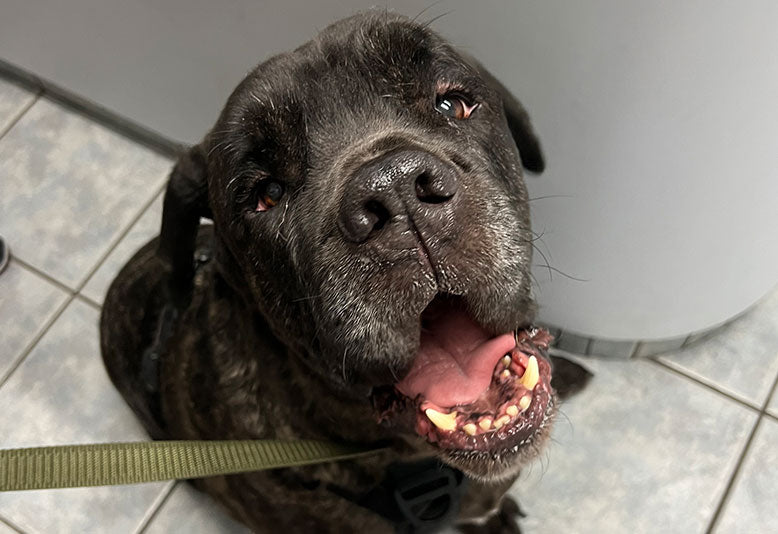
Real Results: How NeuroChew Helped Brutus Regain His Mental Clarity
Brutus was getting disoriented at night. After starting NeuroChew, he's more happy during the day and steady at night. He's back to his old self!
Partnering with Your Vet on Your Dog's Health
Your veterinarian is your most important ally on your dog’s health journey. We get it—bringing up nutrition or supplements can sometimes feel a little intimidating. But remember, you are your dog’s most dedicated advocate. The knowledge you’ve picked up here about folic acid isn't meant to replace their medical advice; it’s designed to arm you with the confidence to start a great conversation.
You are an active partner in your dog's well-being. Being proactive—like understanding the role B-vitamins play in everything from red blood cells to brain function—is a powerful reflection of the bond you share.
Making the Most of Your Vet Visit
To make sure you and your vet are on the same page, it helps to show up prepared. The little things you notice at home are invaluable clues that help your vet see the complete picture.
Here’s how you can make that conversation count:
- Share What You See: Talk about any subtle shifts you've noticed. Is your dog a little more tired than usual? Less excited about their dinner? These details matter.
- Ask Specific Questions: Don't be afraid to ask directly, "Do you think a nutritional gap could be part of what's going on?" or "Could a supplement that supports circulation be a good idea for them?"
- Talk About Their Whole Diet: Be open about their current food, treats, and yes, even those little table scraps. This gives your vet the full story on their nutritional intake.
Your vet can run simple blood tests to look for things like anemia, which can sometimes be a sign of a B-vitamin deficiency. This gives you both a clear, science-backed starting point for any health plan you create together.
At the end of the day, your goal and your vet's goal are identical: to give your dog the happiest, most comfortable life imaginable. Every step you take is a move toward more good days together.
Ultimately, this is all about partnership. When you combine your deep, personal understanding of your dog with your vet's medical expertise, you form an unbeatable team. You’re already doing an amazing job, and that dedication will continue to make all the difference in their golden years.
Your Questions About Folic Acid for Dogs, Answered
When you're exploring new ways to support your dog, it's natural to have questions. That's a good thing—it means you're being a thoughtful, proactive pet parent. Let's walk through some of the most common questions we hear.
How Much Folic Acid Does My Dog Need?
That's the million-dollar question, and the honest answer is: it really depends. There’s no single magic number for dog folic acid. The ideal amount hinges on your dog’s age, size, breed, diet, and any specific health challenges they might be facing.
This is exactly why a conversation with your veterinarian is your best first step. They can see the full picture of your dog's health and give you personalized advice, making sure your companion gets just the right amount of support.
Is Folic Acid Safe for Puppies?
Absolutely. Folic acid isn't just safe for puppies and pregnant dogs; it's essential. This B vitamin is a powerhouse for healthy cell growth and the proper formation of the neural tube in developing puppies. You'll often find it's a key ingredient in high-quality puppy food for this very reason.
Of course, even with something this beneficial, you'll want to run any new supplements by your vet to make sure they fit perfectly with your puppy's specific developmental needs.
How Long Until I See a Difference?
Think of this as a journey, not a sprint. Every dog's system is different, and they'll respond on their own timeline. Some owners might spot small shifts in their dog’s energy or alertness within a few weeks, while for others, the changes are more gradual.
The goal is realistic optimism. We measure success in progress, not perfection—celebrating small wins like more interest in playtime or sleeping more soundly through the night. These are the moments that truly matter.
Patience and consistency are your two best tools here. Supporting your dog's nutrition is a long-term commitment, an act of love that builds their well-being one day at a time.
At Furever Active, we believe that nurturing your dog's health is one of the deepest expressions of the bond you share. Our NeuroChew™ supplement is thoughtfully crafted to support cognitive function and healthy circulation, helping you and your best friend enjoy more good days together. Explore how we can support your dog's journey at https://fureveractive.com.
Share This Article

Support Your Dog's Brain Health with NeuroChew™
The first dog chew that supports both brain function and healthy circulation. Perfect for dogs of all ages.
- Enhances cognitive function & mental clarity
- Reduces anxiety without sedation
- Supports healthy blood circulation
- Made in USA with natural ingredients
60-Day Money-Back Guarantee • Free Shipping



